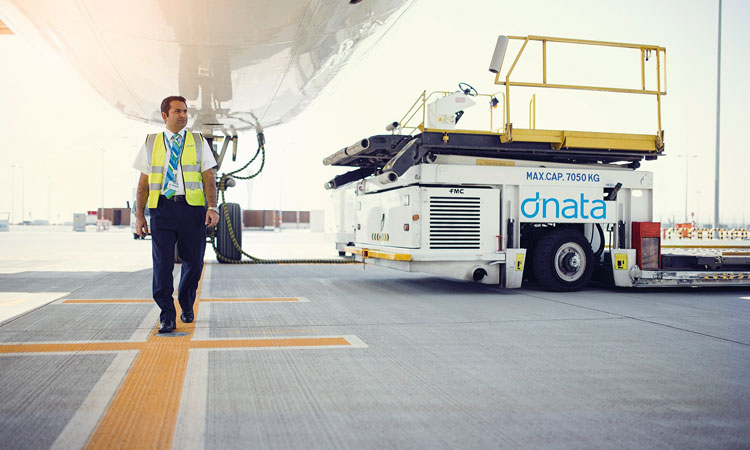Committing to innovation to assist with airside operations
Posted: 19 June 2018 | Janis Balkens | No comments yet
As one of the world’s largest air services providers offering ground handling, in-flight catering and cargo across five continents, dnata is no stranger to the challenges of airside operations. In an exclusive interview, Janis Balkens, dnata’s VP of Commercial at International Airport Operations, reveals how ground handlers can prepare for the future.


As demand for air travel continues to dramatically increase, airside operations teams are stretched to perform their duties under mounting pressure. Janis Balkens, VP of Commercial at dnata’s International Airport Operations, explains: “The biggest challenge for ground handling companies is that the growth of passenger traffic has started to exceed the growth of capacity the facilities offer, which, in certain regions, has already resulted in congestion and the forced limitation of services. The industry will need to find ways to create more capacity or use existing capacity more efficiently, otherwise growth will slow down despite increasing demand.”
He goes on to explain that airport infrastructure also needs significant improvements. This is, in part, down to the fact that many facilities were built decades ago and whilst fit for purpose at the time, do not now meet today’s requirements. “They were designed to serve a different business model. The low-cost segment is rapidly growing; the needs, preferences and priorities of airlines and passengers are changing, and sustainability is becoming increasingly important. These issues must be reflected in the infrastructure as well,” says Janis. “Bold investment is necessary, which, at the end of the day, will pay off and improve the efficiency and competitiveness of airports.”
As industries change, so too do the processes used in day-to-day operations. So what developments have occurred in the ground handling sector? “We clearly see that the labour-intensive nature of the operations is not sustainable in the long run. Innovation and the use of the latest technologies are now not just ‘nice-to-haves’ anymore but are essential to keep up with the massive growth the industry enjoys. The good news is that the technology already exists.”
Just two examples of innovations currently being used include robotics in the warehousing industry and driverless cars, which have already been tested. Janis explains how the ground handling industry will also need to adopt innovative measures to ensure continued smooth operations. He continues: “Specifically for dnata, we have not been experiencing a reduction of manpower so far; on the other hand, the prosperity of the industry generates new jobs. But we need to think about long-term solutions as we expect the industry to continue to grow and this will generate new challenges.”
So, what are the specific challenges of deploying automation in airside operations? “The issue is the lack of expertise on how new technologies can be applied in the industry,” explains Janis. “Airports have massive opportunities to increase efficiency by implementing existing know-how in their operations, and I do think that as the ‘landlords’ it’s their role to lead the innovation process.
“At dnata, we rigorously challenge our processes and work practices by applying leading technology in our own operations; however, as one of multiple handlers, we cannot invest in the modernisation of the airport’s processes and facilities ourselves. The innovation requires significant commitment from the airports, but in the long run it will benefit all stakeholders.”
As with all airside operations, it’s vital for ground handlers to ensure their operations remain efficient and turnaround times achievable. Realistic planning and continued investment are key factors to success in this respect. But as air traffic escalates, airports need to expand their facilities and transform their processes to remain efficient in accommodating the increasing number of flights and passengers.
Janis reveals: “We can see a number of best practices in Asia and the Middle East where airports were bold enough to invest in a future-proof business model. Their operations became scalable and will help them meet the growing demand.” Stakeholder cooperation is another extremely important factor in ensuring efficient operations. “We are part of a larger eco-system. As a global player with an extensive partnership network, we always aim to harness the value of existing knowledge and relationships,” says Janis. “Cooperation with airlines comes by the genuine nature of our partnership. As a customer-oriented service provider, we are committed to understanding their needs and providing them with tailor-made solutions. We constantly seek feedback and make improvements if necessary.
“We are also keen to support airports and urge them to involve us as partners when creating master plans or designing flows. Operating at over 100 airports across the globe, dnata believes that we can add value with our expertise. We are pleased to support any development by sharing our experience and best practices. This is our natural interest: if the airport operations improve, the customer experience will also improve.
But Janis doesn’t take their position for granted, explaining that their market position happily accommodates collaborative propositions: “As for cooperation with competitors, we have always been open to opportunities where there are synergies that will increase efficiency,” he explains.
Today’s ground handling sector is labour-intensive throughout the globe. Janis believes that this will change and that, along with the implementation of technological innovations, more processes will become automated.
Janis concludes: “At dnata we already devote significant time and resources to identifying the key trends and ensure that we’re well-prepared for the upcoming changes. We invest in our people, processes and technology accordingly.”
Biography
Janis Balkens is VP Commercial, International Airport Operations at dnata. He joined dnata in 2014 as Head of Ground Handling Services for International Operations. His earlier positions have included those of CEO of HAVAS Europe in Latvia, Finland, Germany and Sweden; VP and Member of the Board at Riga International Airport; and Business Development Manager at SAS Ground Services, UK. Prior to that Janis was VP Ground Operations in the airBaltic Corporation.
The International Airport Summit is open for registration!
Date: 19 – 20 November 2025
Location: JW Marriott Hotel Berlin
At our flagship event of the year, we will dive into the future of airport operations, with expert-led sessions on passenger experience, innovative smart technologies, baggage handling, airside operations, data, security, and sustainability.
This is where global airport leaders come together to share insights, challenges, and real-world solutions.
Limited complimentary passes are available for eligible professionals – first come, first served!
Issue
Related topics
Aeronautical revenue, Air freight and cargo, Airside operations, Ground handling, Safety


















